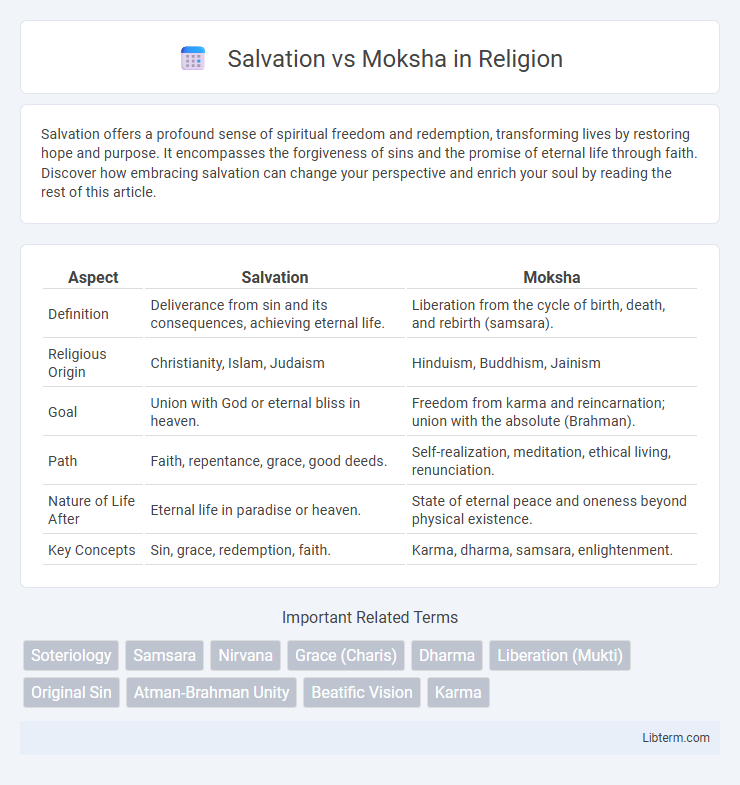Salvation offers a profound sense of spiritual freedom and redemption, transforming lives by restoring hope and purpose. It encompasses the forgiveness of sins and the promise of eternal life through faith. Discover how embracing salvation can change your perspective and enrich your soul by reading the rest of this article.
Table of Comparison
| Aspect | Salvation | Moksha |
|---|---|---|
| Definition | Deliverance from sin and its consequences, achieving eternal life. | Liberation from the cycle of birth, death, and rebirth (samsara). |
| Religious Origin | Christianity, Islam, Judaism | Hinduism, Buddhism, Jainism |
| Goal | Union with God or eternal bliss in heaven. | Freedom from karma and reincarnation; union with the absolute (Brahman). |
| Path | Faith, repentance, grace, good deeds. | Self-realization, meditation, ethical living, renunciation. |
| Nature of Life After | Eternal life in paradise or heaven. | State of eternal peace and oneness beyond physical existence. |
| Key Concepts | Sin, grace, redemption, faith. | Karma, dharma, samsara, enlightenment. |
Defining Salvation and Moksha
Salvation in many religious traditions refers to the deliverance from sin and its consequences, often implying eternal life or union with a divine presence through faith or righteous actions. Moksha, in Hinduism and other Indian philosophies, signifies liberation from the cycle of birth, death, and rebirth (samsara), achieved through self-realization and union with the ultimate reality (Brahman). Both concepts emphasize spiritual freedom, but Salvation centers on divine grace and redemption, while Moksha focuses on transcending worldly existence by realizing one's true nature.
Origins in Religious Traditions
Salvation in Christianity originates from the belief in Jesus Christ's sacrificial death and resurrection, offering redemption from sin and eternal life with God. Moksha, rooted in Hinduism, Jainism, and Buddhism, signifies liberation from the cycle of birth, death, and rebirth (samsara) through self-realization and spiritual knowledge. These concepts reflect distinct religious traditions, with salvation emphasizing divine grace and moksha focusing on personal spiritual enlightenment.
Core Philosophical Differences
Salvation in Christianity centers on the belief in Jesus Christ as the savior who redeems sinners and grants eternal life through grace and faith, emphasizing a personal relationship with God. Moksha in Hinduism involves liberation from the cycle of birth, death, and rebirth (samsara) through self-realization, knowledge (jnana), and detachment from material desires, leading to union with the ultimate reality (Brahman). While salvation is often seen as a divine gift granted by God, moksha requires an individual's inner spiritual effort and awakening to transcend worldly existence.
Concept of the Soul and Self
Salvation in many religious traditions involves the soul's deliverance from sin and its union with a divine entity, emphasizing the transformation or purification of the soul. Moksha in Hindu philosophy represents the liberation of the self (Atman) from the cycle of birth, death, and rebirth (samsara), realizing its oneness with the ultimate reality (Brahman). While salvation often centers on the soul's relationship with God, moksha focuses on transcending individual ego and recognizing the self's eternal nature beyond material existence.
Pathways to Liberation
Salvation in Christianity is achieved through faith in Jesus Christ, repentance, and grace, emphasizing a personal relationship with God and eternal life in heaven. Moksha in Hinduism involves liberation from the cycle of birth and death (samsara) through self-realization, meditation, and adherence to dharma, often attained via paths like Bhakti (devotion), Jnana (knowledge), and Karma (action). Both concepts underscore transformative spiritual journeys toward ultimate freedom and union with the divine.
The Role of Divine Grace
Divine grace plays a pivotal role in both Salvation and Moksha, serving as the ultimate force that facilitates spiritual liberation and union with the divine. In Christianity, salvation is achieved through faith and the grace of God bestowed upon believers, enabling redemption from sin and eternal life. In Hindu philosophy, Moksha is attained through divine grace alongside self-realization, allowing the soul to transcend the cycle of birth and death and merge with the universal consciousness.
Human Effort and Spiritual Discipline
Salvation in many religious traditions often emphasizes faith and divine grace as essential, while human effort and spiritual discipline serve as supportive practices to align the soul with God's will. Moksha, primarily in Hindu philosophy, underscores rigorous personal effort through spiritual disciplines such as yoga, meditation, and adherence to dharma, aiming for liberation from the cycle of birth and death. The distinction lies in salvation's reliance on external divine intervention contrasted with moksha's focus on internal self-realization achieved through disciplined human endeavor.
End Goals: Heaven vs Liberation
Salvation in many religious traditions is often defined as the soul's ascent to Heaven, a realm of eternal happiness and union with the divine. Moksha, central to Hinduism and other Dharmic religions, represents liberation from the cycle of birth, death, and rebirth (samsara), achieving ultimate freedom and self-realization. The end goal of salvation emphasizes divine grace and eternal life in a transcendent realm, while moksha focuses on self-liberation and the cessation of worldly suffering.
Ethical and Moral Implications
Salvation in Abrahamic traditions emphasizes adherence to divine commandments and moral law as a pathway to eternal life and forgiveness, stressing accountability and ethical conduct in daily actions. Moksha in Hindu philosophy centers on liberation from the cycle of rebirth through self-realization, often encouraging detachment from material desires and ego-driven behavior to achieve moral purity and spiritual enlightenment. Both concepts underscore a transformative ethical framework, where salvation involves obedience to a prescribed moral code, and Moksha promotes inner ethical evolution and transcendence of worldly attachments.
Contemporary Relevance and Application
Salvation in Christianity and Moksha in Hinduism both address liberation from worldly suffering but differ in contemporary relevance and application. Salvation emphasizes faith, grace, and eternal life through Jesus Christ, guiding millions in moral living and community service amid modern challenges. Moksha focuses on self-realization, detachment, and breaking the cycle of rebirth, influencing contemporary practices like yoga, meditation, and mindfulness for inner peace and spiritual growth.
Salvation Infographic

 libterm.com
libterm.com